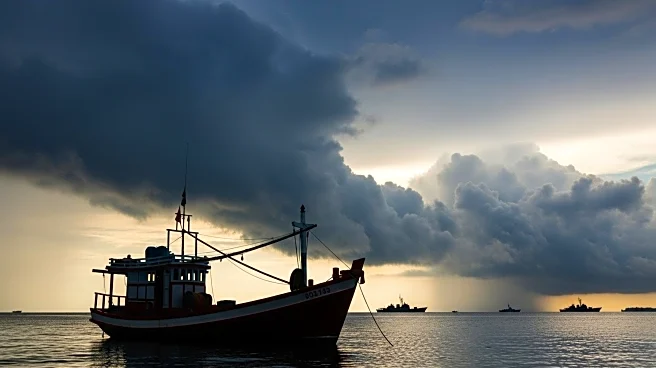What is the story about?
What's Happening?
Fishermen in Trinidad and Tobago are expressing concerns over their safety and livelihoods amid escalating tensions between the United States and Venezuela. The U.S. has conducted military strikes on vessels suspected of drug trafficking in the Caribbean, with President Trump declaring an 'armed conflict' with drug cartels in the region. These actions have led to fears among local fishermen that their boats could be mistaken for drug-smuggling vessels, putting their lives at risk. The geopolitical tension has also affected the fishing industry, as fishermen are now forced to operate in shallower waters, reducing their catch and impacting their income.
Why It's Important?
The situation highlights the broader implications of U.S. military operations in the Caribbean, affecting not only international relations but also local economies and communities. Trinidad and Tobago's fishing industry, a significant economic sector, is under threat as fishermen face the dual challenges of piracy and military presence. The U.S. actions, intended to curb drug trafficking, inadvertently place innocent civilians at risk, raising ethical concerns about collateral damage. The tension also underscores the fragile nature of regional peace and the potential for conflict escalation, which could have far-reaching consequences for Caribbean nations.
What's Next?
The ongoing military operations and the response from Venezuela, which has placed its military on high alert, suggest that tensions may continue to rise. Trinidad and Tobago's government may need to engage in diplomatic efforts to ensure the safety of its citizens and maintain regional stability. The situation calls for dialogue between the U.S., Venezuela, and Caribbean nations to prevent further escalation and protect civilian lives. Additionally, the impact on the fishing industry may prompt local authorities to seek support or compensation for affected fishermen.
Beyond the Headlines
The ethical implications of military actions in civilian areas are significant, as they raise questions about the balance between national security and human rights. The situation also reflects the complex interplay between drug enforcement policies and their unintended consequences on local communities. Long-term, the region may need to explore alternative strategies for addressing drug trafficking that minimize harm to civilians and promote sustainable economic development.

















